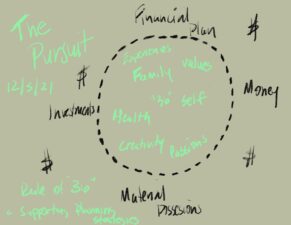With the excitement around Robinhood’s S-1 filing yesterday and its upcoming IPO, I have no doubt more investors will be giving the company a look, which is hard to believe given that it has over 18 million accounts and $80 billion in assets on the platform. Those numbers are bonkers, especially if you look at how it grew from 7 million accounts to 18 million in one year—talk about growth.
I’ve never opened a Robinhood account—I prefer to stick to the custodians I use with my clients, TD Ameritrade and Altruist and a special account I opened at Public to invest with Roman, Leo, and eventually Silas. If you’re looking for a platform to invest on for your “fun” money, I like Public over Robinhood because of their focus on education, good investing behaviors, and overall culture, but that’s just one guy’s two Satoshis.
Speaking of Satoshis…
Some of the $80 billion in assets on the Robinhood platform are cryptoassets. Currently, investors can buy and sell the following cryptoassets:
- Bitcoin
- Bitcoin Cash
- Bitcoin SV
- Dogecoin
- Ethereum
- Ethereum Classic
- Litecoin
I want to draw your attention back to the italicized buy and sell above—I emphasize this because crypto investors do not actually own the cryptoassets they have purchased on Robinhood (and Paypal). At best, they hold an IOU from Robinhood for the cryptoasset they selected. I’m fairly certain most investors do not understand this and will be extremely disappointed when they go to move their crypto to their hardware wallet or other cold storage—their crypto is trapped!
“No keys, no coins”
This is a common phrase any investor in cryptoassets who has done any research before investing has heard. Without the keys, or the unique addresses, to your cryptoassets you don’t really control it. Without control of your keys, you miss out on important opportunities. One missed opportunity is the potential to earn some yield on assets you intend to hold (HODL) for the long term—I staked some of my ETH this week to learn more about that process firsthand. You also miss out on the opportunity to properly account for your cryptoassets within your estate plan. For example, If your BTC is trapped at Robinhood, you are not able to send them to a multi-sig wallet at Casa to protect your crypto and your family if something should happen to you.
Eventually, the Robinhood investor will become more sophisticated and realize the benefits of holding the keys to their cryptoassets and will not be able to simply send their cryptoassets to their personal wallet. In the future, the only way to get your cryptoassets off Robinhood is to sell them, convert to cash, and then repurchase—which you can imagine has the potential to lead to a nice taxable event.
As a financial advisor and a believer in the importance of investing, I love seeing more people getting exposed to the market. I love seeing an innovative company put some pressure on the old dominant companies.
But, I hate seeing investors with their cryptoassets trapped.
So let’s celebrate innovation. Let’s celebrate a successful Fintech company. Let’s celebrate a new group of investors. But let’s make sure cryptoasset investors hold their keys, or at the very least understand the limitations of where they are purchasing their cryptoassets.
I won’t stop you from buying stocks at Robinhood, but I will work hard to direct you to a better option for your cryptoassets.
Disclaimer: Nothing on this blog should be considered advice, or recommendations. If you have questions pertaining to your individual situation you should consult your financial advisor. For all of the disclaimers, please see my disclaimers page.



